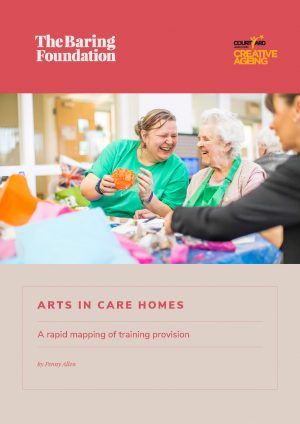It is five years since Consilium Research & Consultancy wrote their significant study, What do we know about the arts in the delivery of care? Since then the field has developed considerably and we asked Penny Allen, an experienced practitioner herself, to undertake a rapid review of where we have got to.
We would like to thank her for this insightful piece of research. While not claiming to be comprehensive, it reveals the breadth of provision, identifying 65 providers of training, interestingly serving the arts and care sectors equally. The training examined here can be in person or online. An astonishing 31 online toolkits were discovered; most, I would suspect, developed in isolation from each other. Mindful of this, we have asked Liz Postlethwaite of Small Things to draw on these resources in producing a compendium of participatory arts exercises for publication this year. The more recent development of a Massive Open Online Course (MOOC), developed by Created Out of Mind and sponsored by the Wellcome Trust, is likely to garner a lot of attention. Penny notes that the style of toolkit has tended to move from making the case for arts in care homes to focusing on practical exercises and tips.
The Baring Foundation has been an active funder in the field of training for arts in care homes, often as one aspect of a broader project. Examples have included cARTrefu in Wales, A Choir in Every Care Home, Luminate’s involvement in a resource pack in Scotland and our encouragement to the Social Care Institute for Excellence to sign-post care homes to resources via their extremely popular website. Training is a major strand of many of the 32 projects we are supporting with the Arts Council England in our Celebrating Age programme. We are pleased that we have now joined forces with Creative Scotland to support a major new initiative there involving Luminate and the Care Inspectorate.
The world of arts in care homes is a complex one in the UK with different regulators, funders and providers in each of the four nations. And beyond the complexity of mapping activity, there lie further questions such as what is the level of demand for training from the care and arts sectors and has this been adequately met. The author highlights the issue of variation in quality of provision and argues strongly for a system of accreditation, but more work would be needed to assess the practical implications of this suggestion.
The need for quality arts in care homes is pressing and training is key to fulfilling that need. Although progress has been made, this must be regarded as unfinished business. This report should help us all reflect on what more needs to be done.
